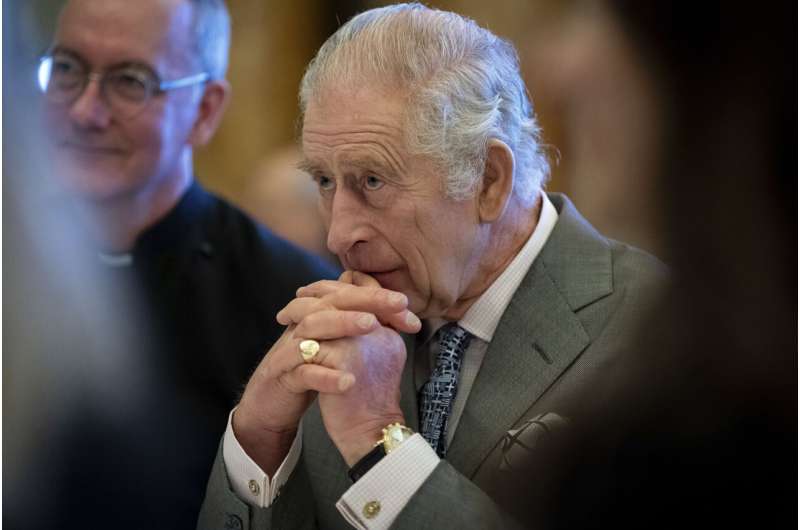This article has been reviewed according to Science X's editorial process and policies. Editors have highlighted the following attributes while ensuring the content's credibility:
fact-checked
reputable news agency
proofread
What are the symptoms of an enlarged prostate and how is it treated?

The announcement that King Charles III was admitted to a private hospital Friday to undergo a procedure for an enlarged prostate has sparked interest in what is an extremely common condition among older men.
The 75-year-old monarch is in good company. About half of men in their 50s have enlarged prostates and that prevalence climbs to more than 80% of men by the time they reach age 80.
It's a common result of aging, said Dr. Stephen Nakada, a University of Wisconsin urologist.
"It's like getting gray hair," Nakada said.
An enlarged prostate doesn't always cause symptoms, but when it does, they can be annoying. And some men have more trouble than others.
A look at the condition, also known as benign prostatic hyperplasia:
WHAT IS THE PROSTATE GLAND?
The prostate is part of the reproductive system in men. It makes fluid for semen. It's located below the bladder and it wraps around the urethra, the tube that carries urine and semen out through the penis.
WHAT CAUSES AN ENLARGED PROSTATE?
First, it's not cancer. The word "benign" in benign prostatic hyperplasia means the prostate isn't cancerous.
What causes the prostate to grow isn't completely clear, but it's possibly caused by hormonal changes as men age.
WHAT ARE THE SYMPTOMS OF AN ENLARGED PROSTATE?
The symptoms of an enlarged prostate can include frequent urination and needing to get up many times in the night to pee. A man might have trouble getting started in the bathroom or dribbling when finished. The inability to completely empty the bladder is also a common symptom.
WHAT MIGHT HELP SYMPTOMS?
Doctors may first advise patients to stop drinking fluids after dinner. Antihistamines can contribute to symptoms, as can alcohol and caffeine.
"A good initial intervention would be to decrease caffeine and alcohol intake, even decrease spicy food intake, because those can irritate the bladder," Nakada said.
HOW IS AN ENLARGED PROSTATE DIAGNOSED?
Doctors will ask about symptoms and medications. They will perform a rectal exam to determine the size and shape of the prostate.
ARE THERE MEDICATIONS THAT HELP?
Medicines are available that relax muscles and allow better flow of urine. Another type of medicine can be used to stop the prostate from growing. Erectile dysfunction drugs can help with urine flow too.
There's not strong evidence for herbal remedies such as saw palmetto.
"I usually tell patients the only thing saw palmetto does is hurt your wallet," Nakada said.
WHAT ARE THE SURGICAL OPTIONS?
There are various procedures to remove prostate tissue or widen the urethra.
Some use the pulse of a laser beam, microwaves, ultrasound, electric current or heated water. Another procedure inserts a stent to prop up the prostate and make more room for urine flow.
There are also surgical techniques to cut away tissue.
COULD THERE BE COMPLICATIONS FROM SURGERY?
All surgeries have potential complications such as bleeding and infections. Prostate surgery can cause urinary or sexual problems. Some of the less invasive procedures may need to be repeated if symptoms come back.
© 2024 The Associated Press. All rights reserved. This material may not be published, broadcast, rewritten or redistributed without permission.



















